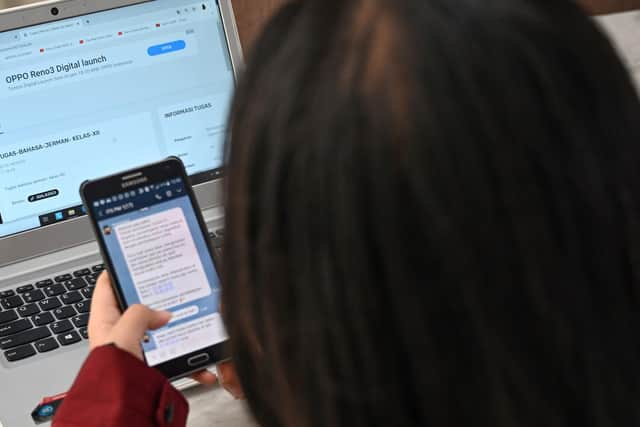Fraudsters trying to exploit coronavirus fear on 'industrial scale'
and live on Freeview channel 276
Hackers are increasingly looking to dupe home workers and gain control of their computers to steal banking or personal information or freeze the screens and demand ransoms of thousands of pounds to unlock it, Cifas chief executive Mike Haley said.
He also warned a mass flurry of malicious data-harvesting emails pretending to be from Government in the wake of the £350 billion economy lifeline was "definitely coming", saying an imminent wave of pandemic-related fraud will see people lose millions of pounds.
Advertisement
Hide AdAdvertisement
Hide AdThere have also been reports of the house-bound elderly and vulnerable being targeted in distraction burglaries with criminals using the health crisis to pretend to be from councils carrying out welfare checks, he said, adding: "Social distancing creates an opportunity for individuals to be picked off."


Mr Haley told the PA news agency: "We've seen fraudsters already exploiting the coronavirus situation on a quite industrial scale - preying on the thirst for information.
"Everyone's checking every five minutes - 'Where are the outbreaks', 'Is it in my area?'
"We're all seeing lots of 'coronavirus latest' emails - it's very easy for one of those to slip through.
Advertisement
Hide AdAdvertisement
Hide Ad"It's a very dangerous opportunity for fraud attacks - they are as virulent as the virus.
"All that distraction, worry, anxiety created by this means people might not take the time to check as usual.
"Everyone's got to think: 'I'm going to be attacked, I'm going to get these calls'. We've got to be extraordinarily wary at the moment."
Mr Haley added mass call centres had already been set up in places like India where scammers are aiming to steal information by tactics like pretending to be from IT support at work and persuading people to hand over control of their screens.
Advertisement
Hide AdAdvertisement
Hide AdHe said the absence of a support network in an office meant people were more likely to fall victim to this kind of scam, adding: "We don't have people immediately around us, so social distancing creates an opportunity for individuals to be picked off."
Mr Haley also warned of the risks of an increase in people persuaded to launder money by "flipping" criminal cash through their bank account for a small cut in a process, known as being a "money mule".
There are likely to be a "lot more desperate people over the next few months" including those on zero-hours contracts and pub and club workers, he said.
Cifas, a leading fraud prevention service, said getting a clear idea of the full scale of any rise in fraud can take several weeks to become apparent. But it said it had seen a reported rise in:
Advertisement
Hide AdAdvertisement
Hide Ad- Fake sites selling hard-to-get items like hand sanitiser and facemasks.
- Criminals exploiting pandemic panic to assist in distraction burglaries by feigning to be checking on vulnerable homeowners under numerous guises.
- A rise in coronavirus-related emails and adverts offering medication, vaccination kits and medical aids, and donations for charities and victims.
- Fake "Government" emails following announcements around financial help for freelancers and businesses.
Advertisement
Hide AdAdvertisement
Hide Ad- Fraudsters purporting to be from travel companies asking for personal information regarding cancelled holidays.
- An increase in adverts for "money mule" recruitment, targeting people who may be struggling financially.